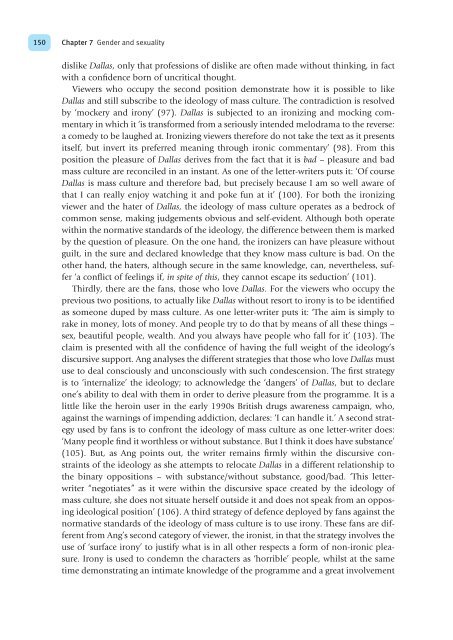Cultural Theory and Popular Culture
Cultural Theory and Popular Culture
Cultural Theory and Popular Culture
You also want an ePaper? Increase the reach of your titles
YUMPU automatically turns print PDFs into web optimized ePapers that Google loves.
150<br />
Chapter 7 Gender <strong>and</strong> sexuality<br />
dislike Dallas, only that professions of dislike are often made without thinking, in fact<br />
with a confidence born of uncritical thought.<br />
Viewers who occupy the second position demonstrate how it is possible to like<br />
Dallas <strong>and</strong> still subscribe to the ideology of mass culture. The contradiction is resolved<br />
by ‘mockery <strong>and</strong> irony’ (97). Dallas is subjected to an ironizing <strong>and</strong> mocking commentary<br />
in which it ‘is transformed from a seriously intended melodrama to the reverse:<br />
a comedy to be laughed at. Ironizing viewers therefore do not take the text as it presents<br />
itself, but invert its preferred meaning through ironic commentary’ (98). From this<br />
position the pleasure of Dallas derives from the fact that it is bad – pleasure <strong>and</strong> bad<br />
mass culture are reconciled in an instant. As one of the letter-writers puts it: ‘Of course<br />
Dallas is mass culture <strong>and</strong> therefore bad, but precisely because I am so well aware of<br />
that I can really enjoy watching it <strong>and</strong> poke fun at it’ (100). For both the ironizing<br />
viewer <strong>and</strong> the hater of Dallas, the ideology of mass culture operates as a bedrock of<br />
common sense, making judgements obvious <strong>and</strong> self-evident. Although both operate<br />
within the normative st<strong>and</strong>ards of the ideology, the difference between them is marked<br />
by the question of pleasure. On the one h<strong>and</strong>, the ironizers can have pleasure without<br />
guilt, in the sure <strong>and</strong> declared knowledge that they know mass culture is bad. On the<br />
other h<strong>and</strong>, the haters, although secure in the same knowledge, can, nevertheless, suffer<br />
‘a conflict of feelings if, in spite of this, they cannot escape its seduction’ (101).<br />
Thirdly, there are the fans, those who love Dallas. For the viewers who occupy the<br />
previous two positions, to actually like Dallas without resort to irony is to be identified<br />
as someone duped by mass culture. As one letter-writer puts it: ‘The aim is simply to<br />
rake in money, lots of money. And people try to do that by means of all these things –<br />
sex, beautiful people, wealth. And you always have people who fall for it’ (103). The<br />
claim is presented with all the confidence of having the full weight of the ideology’s<br />
discursive support. Ang analyses the different strategies that those who love Dallas must<br />
use to deal consciously <strong>and</strong> unconsciously with such condescension. The first strategy<br />
is to ‘internalize’ the ideology; to acknowledge the ‘dangers’ of Dallas, but to declare<br />
one’s ability to deal with them in order to derive pleasure from the programme. It is a<br />
little like the heroin user in the early 1990s British drugs awareness campaign, who,<br />
against the warnings of impending addiction, declares: ‘I can h<strong>and</strong>le it.’ A second strategy<br />
used by fans is to confront the ideology of mass culture as one letter-writer does:<br />
‘Many people find it worthless or without substance. But I think it does have substance’<br />
(105). But, as Ang points out, the writer remains firmly within the discursive constraints<br />
of the ideology as she attempts to relocate Dallas in a different relationship to<br />
the binary oppositions – with substance/without substance, good/bad. ‘This letterwriter<br />
“negotiates” as it were within the discursive space created by the ideology of<br />
mass culture, she does not situate herself outside it <strong>and</strong> does not speak from an opposing<br />
ideological position’ (106). A third strategy of defence deployed by fans against the<br />
normative st<strong>and</strong>ards of the ideology of mass culture is to use irony. These fans are different<br />
from Ang’s second category of viewer, the ironist, in that the strategy involves the<br />
use of ‘surface irony’ to justify what is in all other respects a form of non-ironic pleasure.<br />
Irony is used to condemn the characters as ‘horrible’ people, whilst at the same<br />
time demonstrating an intimate knowledge of the programme <strong>and</strong> a great involvement
















